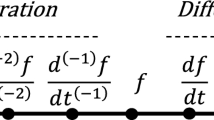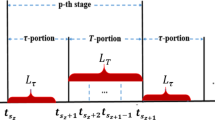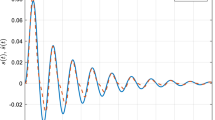Abstract
This work studies the adaptive issue of nonlinear switched system with state delays. Different from the reported works, the research is more challenging since the system is in non-triangular form and has multiple uncertainties such as unmodeled dynamic, unknown parameters, and unknown coefficients. By presenting a dynamic-gain-based adaptive fuzzy regulation strategy, and constructing a novel Lyapunov–Krasovskii (L–K) functional, a new robust adaptive controller is successfully designed. The raised strategy is validated using a simulation example.

Similar content being viewed by others
References
Khalil, H.K., Grizzle, J.W.: Nonlinear Systems. Prentice hall, Upper Saddle River (2002)
Feng, S.S., Sun, Z.Y., Zhou, C.Q., et al.: Output tracking control via neural networks for high-order stochastic nonlinear systems with dynamic uncertainties. Int. J. Fuzzy Syst. 23(3), 716–726 (2021)
Kanellakopoulos, I., Kokotovic, P.V., Morse, A.S.: Systematic design of adaptive controllers for feedback linearizable systems. In: American Control Conference, pp. 649–654 (1991)
Li, Y., Tong, S., Liu, L., Feng, G.: Adaptive output-feedback control design with prescribed performance for switched nonlinear systems. Automatica 80, 225–231 (2017)
Li, Y., Liu, Y., Tong, S.: Observer-based neuro-adaptive optimized control of strict-feedback nonlinear systems with state constraints. IEEE Trans. Neural Netw. Learn. Syst. (2021). https://doi.org/10.1109/TNNLS.2021.3051030
Bai, W., Li, T., Long, Y., Chen, C.P.: Event-triggered multigradient recursive reinforcement learning tracking control for multiagent systems. IEEE Trans. Neural Netw. Learn. Syst. (2021). https://doi.org/10.1109/TNNLS.2021.3094901
Li, T., Bai, W., Liu, Q., Chen, C.P.: Distributed fault-tolerant containment control protocols for the discrete-time multiagent systems via reinforcement learning method. IEEE Trans. Neural Netw. Learn. Syst. (2021). https://doi.org/10.1109/TNNLS.2021.3121403
Zhao, X., Kao, Y., Niu, B., et al.: Control Synthesis of Switched Systems. Springer, Cham (2017)
Sun, Z., Ge, S.S.: Stability Theory of Switched Dynamical Systems. Springer, New York (2011)
Ma, R., Zhao, J., Dimirovski, G.M.: Backstepping design for global robust stabilisation of switched nonlinear systems in lower triangular form. Int. J. Syst. Sci. 44(4), 615–624 (2013)
Xue, L., Liu, Z., Zhang, W.: Decentralized tracking control for a class of stochastic high-order time-delay nonlinear systems under arbitrary switchings. J. Frankl. Inst. 357(2), 887–905 (2020)
Zhao, X., Shi, P., Zheng, X., et al.: Intelligent tracking control for a class of uncertain high-order nonlinear systems. IEEE Trans. Neural Netw. Learn. Syst. 27(9), 1976–1982 (2015)
Liu, Q., Zhang, X., Li, H.: Global regulation for feedforward systems with both discrete delays and distributed delays. Automatica 113, 108753 (2020)
Jiao, X., Shen, T.: Adaptive feedback control of nonlinear time-delay systems: the LaSalle-Razumikhin-based approach. IEEE Trans. Autom. Control 50(11), 1909–1913 (2005)
Wang, T., Luo, X., Li, W.: Razumikhin-type approach on state feedback of stochastic high-order nonlinear systems with time-varying delay. Int. J. Robust Nonlinear Control 27(16), 3124–3134 (2017)
Zhang, X., Lin, W., Lin, Y.: Iterative changing supply rates, dynamic state feedback, and adaptive stabilization of time-delay systems. IEEE Trans. Autom. Control 64(2), 751–758 (2018)
Sun, Z.Y., Yang, S.H., Li, T.: Global adaptive stabilization for high-order uncertain time-varying nonlinear systems with time-delays. Int. J. Robust Nonlinear Control 27(13), 2198–2217 (2017)
Li, H., Sun, H., Hou, L.: Adaptive fuzzy PI output feedback control for a class of switched nonlinear systems with unmodeled dynamics and dead-zone output. Int. J. Fuzzy Syst. 24(1), 728–751 (2022)
Wu, W., Tong, S.: Robust adaptive fuzzy control for non-strict feedback switched nonlinear systems with unmodeled dynamics. Int. J. Syst. Sci. 52(2), 307–320 (2021)
Qian, C.: A homogeneous domination approach for global output feedback stabilization of a class of nonlinear systems. In: American Control Conference, pp. 4708–4715 (2005)
Qian, C., Lin, W.: A continuous feedback approach to global strong stabilization of nonlinear systems. IEEE Trans. Autom. Control 46(7), 1061–1079 (2001)
Acknowledgements
This work is supported by National Natural Science Foundation of China (Grant nos. 61903239 and 62173208), Project funded by China Postdoctoral Science Foundation (Grant number: 2022M712089), Natural Science Foundation of Shandong Province for Key Projects under Grant ZR2020KA010 and "Guangyue Young Scholar Innovation Team" of Liaocheng University under Grant LCUGYTD2022-01.
Author information
Authors and Affiliations
Corresponding author
Ethics declarations
Conflict of interest
The authors have no conflict of interest in this paper.
Appendix
Appendix
Proof of (21)
According to (19), we get
Using Lemma 1, we have
where \(\phi _{k1}=m2^{\frac{r_{k+1}}{2r_n-r_{k+1}}}\frac{2r_n-r_{k+1}}{r_n} \Bigg (\frac{r_{k+1}(n+1)}{r_n\kappa _1}\Bigg )^{\frac{r_{k+1}}{2r_n-r_{k+1}}}\). Similarly, we have
where \(\phi _{k2}\) is a smooth function, \(C_{k1}\) and \(\epsilon _k\) are positive constants. Then, using (34) and (35), we obtain
where \(\varphi _{k2}=\phi _{k1}+\phi _{k2}\). This completes the proof. \(\square\)
Proof of (22)
By (19), we have
Defining \({{\tilde{H}}}_j(x)=\max _{1\le l\le S}\{{\bar{H}}_{j, l}(x)\}, 1\le j\le k\), by Lemma 2.2 in [19], in a compact set, we can find a fuzzy system \(\Phi _j^{\top }S_j\) such that \({{\tilde{H}}}_j(x)=\Phi _j^{\top }S_j+\varsigma _j\), where \(|\varsigma _j|\le \iota _j\) is the error. It follows that
where \({{\bar{\varphi }}}_{k1}=\frac{2r_n-r_{k+1}}{r_n} \big (\frac{r_{k+1}\epsilon _k}{r_n}\big )^{\frac{r_{k+1}}{2r_n-r_{k+1}}}\). Similarly, we have
where \({{\bar{\varphi }}}_{k2}\) denotes a smooth function. Using Lemma 1, it follows that
where \({{\bar{\varphi }}}_{k3}\) denotes a smooth function. Similarly, we obtain
where \({{\bar{\varphi }}}_{k4}\) is a smooth function. By (37)–(41), and let \(\varphi _{k3}=\sum ^{k}_{j=1}{{\bar{\varphi }}}_{kj}\), we show that (22) holds. \(\square\)
Proof of (23)
For \(1\le j\le k\), defining \(\bar{H}_j({\bar{x}}_j(t-d_k))=\max _{1\le l\le S}\{H_{j,l}({\bar{x}}_k(t-d_k))\}\), we get
\(\square\)
By using (2), we obtain
where \({{\tilde{H}}}_{j}\) is a smooth function, \({\bar{C}}_{k1}>0\) is a constant. Similarly, there holds
where \({\bar{C}}_{j1}>0\) is a constant, \({{\hat{H}}}_{l}\) denotes a smooth function. Also, we obtain
Rights and permissions
About this article
Cite this article
Liu, ZG., Zhao, YZ., Sun, W. et al. Dynamic-Gain-Based Adaptive Fuzzy Control for Uncertain Delayed Non-triangular Switched Nonlinear Systems. Int. J. Fuzzy Syst. 24, 3745–3755 (2022). https://doi.org/10.1007/s40815-022-01360-6
Received:
Revised:
Accepted:
Published:
Issue Date:
DOI: https://doi.org/10.1007/s40815-022-01360-6




